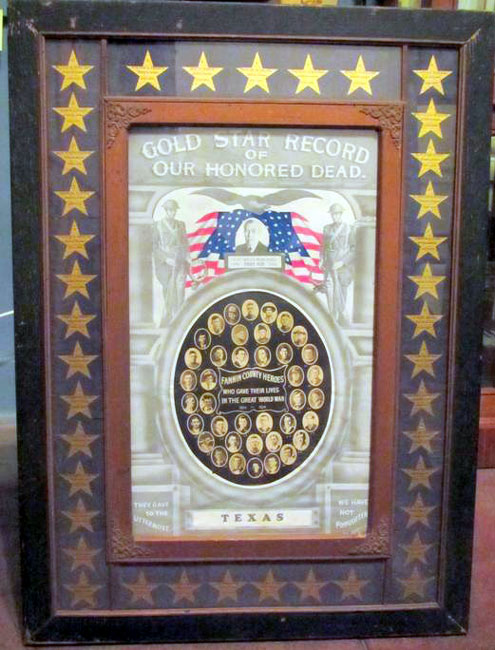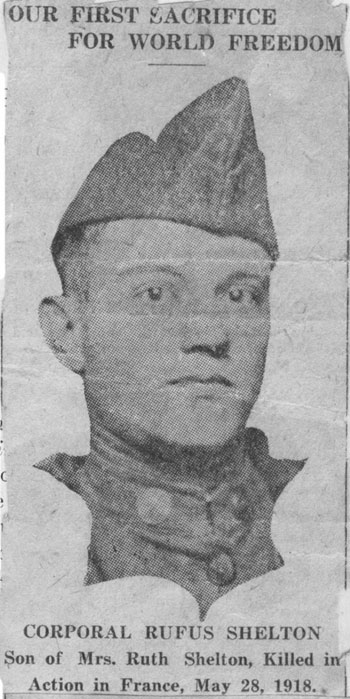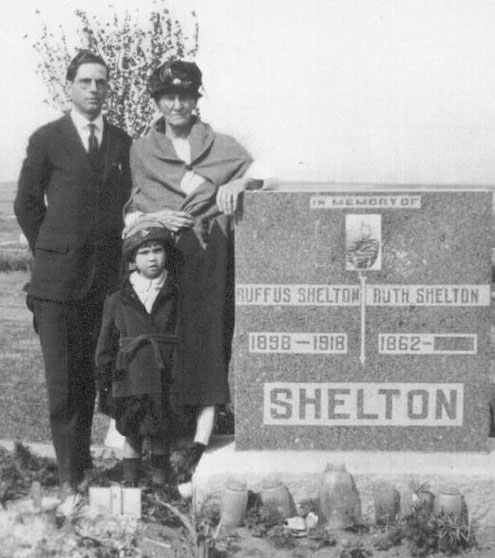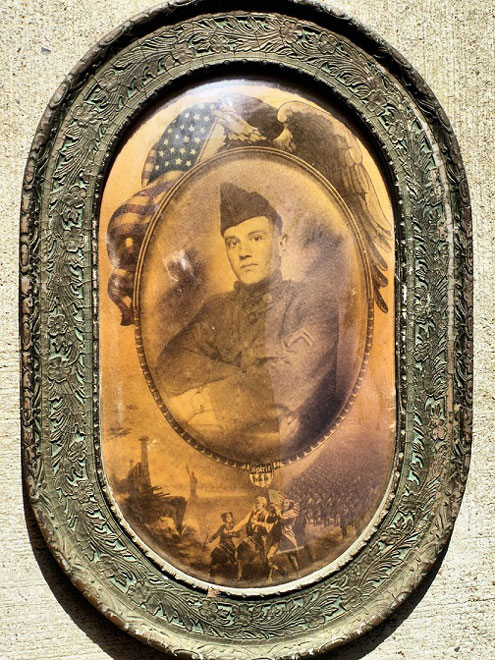Over one hundred years ago, what we now call World War I was raging throughout Europe. It began as a squabble among the kings in Europe who were all cousins. Nine million soldiers and seven million civilians died. The stalemate that ended the war sowed the seeds for World War II.
Here in Fannin County, young men from the farms and towns, white and black, reported for the draft. Many who went off to training camps had never before left Fannin County. Some never returned to live in Fannin County because of their exposure to the wider world. Some returned wounded, and some returned dead.
We have identified 62 young servicemen from Fannin County who died during World War I. Many died from the influenza epidemic sweeping the world as they lived in crowded barracks and were transported on crowded trains and on ships. Others died overseas in battle.
A beautiful remembrance of these honored dead is at the Fannin County Museum of History.

The first Fannin County boy to die overseas in battle was Rufus Shelton. [Sometimes his name is spelled "Rufus" and sometimes "Ruffus."]

Ruffus A. Shelton was born in Honey Grove, Texas on March 2, 1898. He was the seventh child of nine children in that family. His father was a farmer who operated a farm near the small community of Dial, southeast of Honey Grove.
When Ruffus was only six years old, his father (Benjamin Anderson Shelton) died at 45 years of age, leaving his mother (Ruth Ann Cassann) to raise a house full of small children. With the help of an older son, Ruth Ann remained on the farm and cared for her family, which also included her own widowed and elderly mother.
America had just entered World War I, and on May 25, 1917, Ruffus took the oath to enter the United States Army. He was given serial # 58477 and appears to have received some very basic training at Fort Ringgold, Texas before being shipped overseas. Ruffus Shelton was assigned to Company L, 28th Regiment of the 1st Infantry Division, which later became known as “The Big Red 1”. On June 14, 1917, Private Ruffus Shelton boarded the S.S. Tenadores with his company and sailed for France. His commanding officer was Lloyd R. Fredenhall, a career military officer who later served in World War II. Though Fredenhall acquired somewhat of a disgraced career in the second big war, he was eventually promoted to Lieutenant General in 1943.
Upon arriving in Europe, the 1st Infantry Division received continued training at Gondrecourt that summer and was then assigned to the trenches at Sommervillers in October of that year. By early March 1918, the division was first transferred to Seicheprey and then to Cantigny in mid-April. Cantigny is located about 75 miles north of Paris, France.
The Battle of Cantigny began on May 28, 1918 and was the first American offensive of World War I. The U.S. 1st Division was the most experienced of the seven American divisions in France and was placed in reserve for the French Army near the village of Cantigny, which was selected for the attack. The objective of the assault was to reduce a small stronghold that was held by the German army in the front lines and was also designed to instill confidence among the French and British allies.
Ruffus Shelton’s company commander was Francis Marion Van Natter, from Indiana; and his platoon leader was Richard Ager Newhall, from Minneapolis, Minnesota. Ruffus had been promoted to the rank of corporal and was becoming more seasoned in the 2nd Platoon of Company L, 28th Regiment, of the US 1st Division. On May 29, 1918, Ruffus A. Shelton was killed while participating in trench warfare in the Battle of Cantigny. He was barely 20 years old, was unmarried, and had no children.
Ruffus had been assigned as a special runner to deliver messages from the front lines, to headquarters, and back again. In the course of a heavy artillery bombardment from the German canons, Ruffus and two other soldiers sought cover in a bomb crater, which then received direct impact from another incoming shell, killing all three men. Mr. Shelton had sustained severe injuries and after the shelling had quietened, the men’s bodies were quickly moved to a temporary field cemetery, buried, then hastily and mistakenly identified. About six months later the remains of American soldiers were to be moved to military cemeteries, and the man who disinterred the body of Ruffus Shelton found in the inside pocket of the dead soldier's coat a recently written letter addressed to his mother. Because dog tags were not used during that period, the letter was the only thing on the young soldier’s body to identify him. The letter showed clearly that the boy felt he would be killed in the great drive which was to be made next day, but no letter ever penned breathed a more loyal spirit to country or a more beautiful love from son to mother. The man who found the letter sent it to the boy's mother. Though it had been buried six months, the letter was still readable. It said, as follows:
"Dear Mother: — I am writing these few lines so that in case I do not return you may know how I feel about the war. Mamma, we are about to enter into the first drive that the United States has made in the war, find I am sure it will be a great success; in fact I know it will. There are some of us that will not live through it, but mamma, the reason I am writing you these, few lines is to let you 'know that I am willing to give my life gladly, and I think very little of the man who would not. For me to fall on the field of honor I know would hurt you, but not like it would if you knew I was not giving my life freely for my country, and that I have been living a better life—a life that will make me ready to go when the Lord calls me. Mother, we may not meet on earth again, but some day we will meet and there will no sorrows there. And if I go, mother, in my last minutes on earth my thoughts will be of the dear little mother who alone has fought the battles of life for the last fourteen years—long years—to raise me to where I am now.”
"I have gone through many hardships since I have been over here that it did not look like I could go through, but I went through all o. k. and I am glad I have. I have always tried to do my duty and be as cheerful as I could. It does not matter what hardships I have gone through, they could not compare with those you have suffered for me. I know I am not worth half the trouble you have endured for me, but if I had lived to come back one aim in life for me was to come back and show the world that I could be somebody, and most of all to show mother how much I love her. With love to mother I remain your son. God keep and bless you till we meet again. — Corporal Rufus Shelton."
After receiving word of her son’s death, Ruth Ann Shelton wrote numerous letters to the US Army, the War Department, and her congressman, Sam Rayburn – trying to gain more information of her son’s whereabouts, sometimes with little success.
After the war was over, and the military agreed to return some of the deceased to the United States, Ruth Ann Shelton purchased a large headstone, which displayed Ruffus’ name next to her name. Ruth Ann lived until April 15, 1949 and had chosen to be buried next to her son in the Oakwood Cemetery, rather than next to her husband in the Dial Cemetery.

Ruffus A. Shelton was the first citizen of Fannin County, Texas to have been killed overseas during the Great War, and the American Legion Post # 247 in Honey Grove now bears his name.

Rufus Shelton's body was returned to Honey Grove in 1921 and he was buried at Oakwood Cemetery in Honey Grove. Rain was falling at the hour of the funeral, but in spite of the rain a large crowd was at the cemetery. About 40 ex-servicemen were present, many in uniform. Taps were sounded.
Personal comment by Malinda Allison: As sad as the death of this young man was, it is important to remember that the World War I deaths greatly affected mothers, fathers, grandparents, brothers, sisters and in some cases wives and children. When I read this story, I am so touched by Ruth Shelton and her love for her son. We should remember not only the soldiers, but also the families who lost their precious sons.

